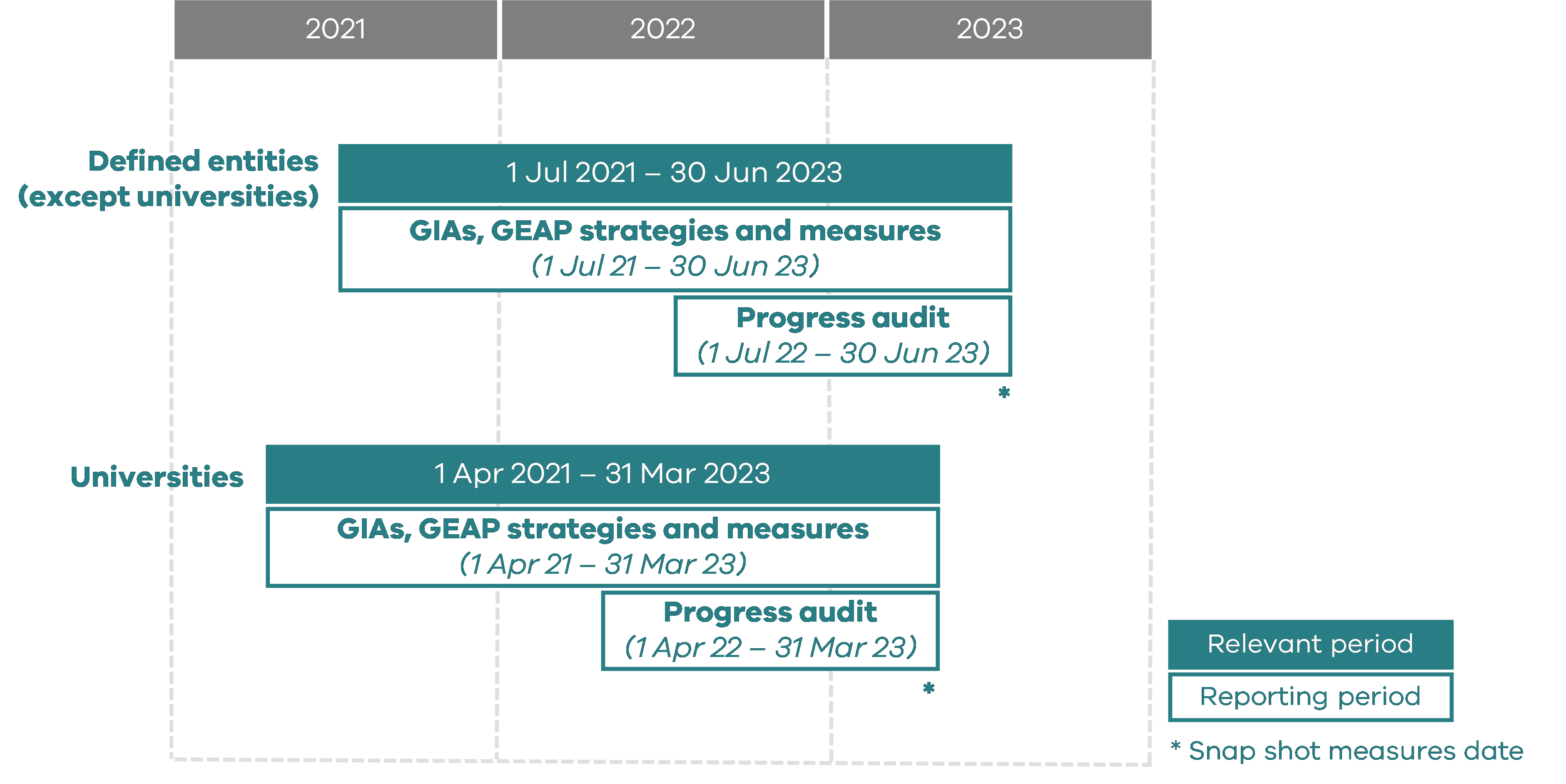Introduction
Monitoring, measuring, and reporting on progress is important to evaluate the success of your Gender Equality Action Plan (GEAP) and gender impact assessments (GIA). This will help you understand whether your actions are achieving positive change towards workplace gender equality, and in promoting gender equality in your policies, programs, and services.
The Gender Equality Act 2020 (the Act) requires defined entities to submit a progress report to the Public Sector Gender Equality Commissioner (the Commissioner) in every second year after submitting a GEAP. The first progress report is due on 20 February 2024.
Progress reports must address the following four elements outlined in section 19 of the Act:
- Gender impact assessments (GIA): report on the policies, programs and services that were subject to a GIA and the outcomes of those GIAs.
- Gender Equality Action Plan (GEAP): report your organisation’s progress in relation to the strategies and measures listed in their GEAP.
- Workplace gender equality indicators: demonstrate your organisation’s progress in relation to the workplace gender equality indicators; and
- Gender equality targets and quotas: demonstrate your organisation’s progress towards meeting any prescribed gender equality targets or quotas. Please note there are currently no prescribed gender equality targets or quotas in place, so you are not required to report on this in the current round of progress reporting. Guidelines to report on progress against targets and quotas will be published if they are prescribed by regulation.
The relevant period for reporting
The relevant period for this progress report is 1 July 2021 to 30 June 2023 (or 1 April 2021 to 31 March 2023 for universities).
Different components of a progress report may have different reporting periods that fall within the relevant period. Reporting periods for each component will be explicit throughout this guidance.
The Commissioner acknowledges that entities received an extension on the submission of their first GEAP, which has shortened the period for implementing GEAP strategies and measures ahead of reporting on progress. As such, the change your organisation has been able to achieve in the relevant period may be impacted.
About these guidelines
These guidelines were developed to help your organisation meet its obligation to complete and submit a progress report as required under the Act.
There are required and recommended items to include within each section of your organisation’s progress report. Required items must be included in your progress report.
Recommended items are optional, however the Commissioner strongly recommends these items are included where possible. Information included in recommended sections in your progress report will assist the Commissioner in assessing your organisation’s compliance with the Act.
This information will also help identify whole-of-sector, industry, and other trends across organisations regarding the barriers to progressing workplace gender equality. This, in turn, may help the Commissioner provide better-tailored support to defined entities to address systemic barriers to gender equality.
These guidelines have an accompanying template you are required to use to ensure you are meeting all criteria. You can download this template from the right hand side of this guidance.
Please refer to the guidance section on the Gender Equality Amendment Regulations 2023 for more information about the requirement to use the template.
A checklist is also provided in this guidance to assist you in ensuring your progress report is compliant with the requirements under the Gender Equality Act.
The appendices include a glossary of terms, advice for changed or new entities, and a summary of each relevant section of the Act that outlines your obligations.
About progress
The Commissioner acknowledges that in some cases progress may not necessarily be evident in numbers alone and may be seen in other forms. For example, an organisation may have made genuine progress through implementing the strategies and measures within their GEAP, while the numbers against the workplace gender equality indicators may suggest their organisation is going backwards.
The Commissioner also recognises that organisations may have experienced severe workforce impacts due to the COVID-19 pandemic, and that compressed timelines due to extensions may impact progress for some organisations.
Further, the Commissioner acknowledges that progress is not always linear and immediate. GEAPs are 4-year action plans, and strategies and measures may have short, medium, and long-term implementation plans. This means that organisations may not necessarily have seen big shifts in progress yet.
These factors will be taken into account by the Commissioner when reviewing progress reports. You may also wish to submit a supporting document that provides further background, context, reflections or key learnings related to the data provided in your progress report. You can find more information about supporting documents in Recommendation 1 of the Submission and Publication chapter.
Privacy and confidentiality
It is important to ensure the privacy and confidentiality of your workforce is maintained throughout the progress reporting process. Information provided to the Public Sector Gender Equality Commissioner will be managed in line with relevant privacy laws. Defined entities are responsible for their own compliance with relevant privacy laws, including the Privacy and Data Protection Act 2014 (Vic) (PDP Act). The Information Privacy Principles (IPPs) that are contained in Schedule 1 of the PDP Act set out the minimum standards for how Victorian public sector bodies should manage personal information.
Other Victorian and Commonwealth laws
When developing your progress report, defined entities must have regard to legal obligations they may have under Commonwealth and State legislation and industrial instruments, including but not limited to:
- The Fair Work Act 2009 (Cth) and other Commonwealth workplace relations legislation
- The Equal Opportunity Act 2010 (Vic) and the Charter of Human Rights and Responsibilities Act 2006 (Vic)
- The Sex Discrimination Act 1984 (Cth) and the Workplace Gender Equality Act 2012 (Cth)
- Enterprise agreements, workplace determinations and modern awards.
Updated


